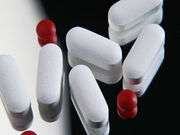Chronic PPI exposure tied to hyperparathyroidism in elderly

(HealthDay)—Chronic proton pump inhibitor (PPI) exposure is associated with mild hyperparathyroidism in elderly adults, according to a study published in the October issue of the Journal of the American Geriatrics Society.
Andrew M. Hinson, M.D., from the University of Arkansas for Medical Sciences in Little Rock, and colleagues examined the effect of PPIs with and without concurrent bisphosphonates (BPs) on parathyroid hormone (PTH), vitamin D, and calcium in a retrospective chart review of individuals aged 60 years and older. Data were included for 80 individuals meeting inclusion criteria.
The researchers found that, compared with no PPI exposure, chronic PPI exposure correlated with significantly higher PTH (65.5 versus 30.3 pg/mL; P < 0.001) and lower calcium (9.1 versus 9.4 mg/dL; P = 0.02). Compared with BP therapy alone, chronic PPI exposure with concurrent BP therapy was associated with significantly higher PTH (65.2 versus 43.4 pg/mL; P = 0.05) and lower calcium (9.2 versus 9.6 mg/dL; P = 0.04).
"Based on the present study, chronic PPI exposure in elderly adults is associated with mild hyperparathyroidism regardless of concurrent oral BP administration," the authors write.
More information:
Abstract
Full Text (subscription or payment may be required)
Copyright © 2015 HealthDay. All rights reserved.

















